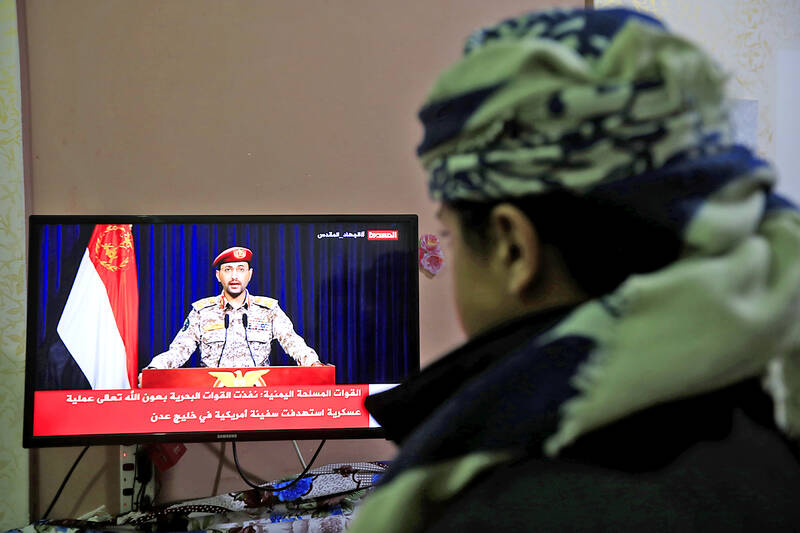Yemen’s Houthi rebels on Monday hit a US-owned cargo vessel with a missile, the US military said, heightening fears for the volatile region after repeated attacks on shipping triggered US and British strikes.
After the Western strikes against scores of rebel targets on Friday last week, the Houthis said they would not be deterred, and declared that US and British interests were “legitimate targets.”
The Marshall Islands-flagged Gibraltar Eagle suffered a fire on board, but no casualties and remained seaworthy, the US Central Command said.

Photo: EPA-EFE
“The ship has reported no injuries or significant damage and is continuing its journey,” said US Central Command, which directs US military operations in the region.
Houthi military spokesman Yahya Saree later said the rebels “carried out a military operation targeting an American ship” in the Gulf of Aden using “a certain number of appropriate naval missiles.”
A Houthi military and a Yemeni government source said that the insurgents fired three missiles.
An anti-ship ballistic missile launched earlier toward shipping lanes in the southern Red Sea failed in flight and crashed on land, US Central Command said.
The incident in the Gulf of Aden, south of the Red Sea, came a day after a Houthi cruise missile targeting a US destroyer was shot down by US warplanes.
Attacks by and against the Houthis, part of the “axis of resistance” of Iran-aligned groups, have raised concerns about violence spreading in the region from the war in Gaza.
The Houthis say their attacks on Red Sea shipping are in solidarity with Gaza, where Iran-backed Hamas militants have been at war with Israel for more than three months.
About 12 percent of global trade normally passes through the Bab al-Mandeb Strait, the Red Sea’s entrance between southwest Yemen and Djibouti, but the rebel attacks have caused much shipping to be diverted thousands of kilometers around Africa.
The US Department of Transportation on Monday recommended that US-linked commercial vessels do not enter the southern Red Sea, warning of “a high degree of risk” from “potential retaliatory attacks.”
In Monday’s attack, the UK Maritime Trade Operations security agency, run by Britain’s Royal Navy, reported a “vessel hit from above by a missile.”
Ambrey, a British maritime risk company, “assessed the attack to have targeted US interests in response to US military strikes,” adding that the vessel was “assessed to not be Israel-affiliated.”
“The impact reportedly caused a fire in a hold. The bulker reportedly remained seaworthy, and no injuries were reported,” Ambrey said in a report.
The ship was transiting the International Recommended Transit Corridor, a passage of the Gulf of Aden that is patrolled for pirates, when it was struck, Ambrey added.
Mohammed Albasha, senior Middle East analyst at the US-based Navanti Group consultancy, said the attack in the Gulf of Aden could signal a change in strategy by the Houthis.
“With the US Navy and Royal Navy warships directing their firepower primarily to the Red Sea, I expect a potential shift, where the Houthis redirect their attention to vessels in the Gulf of Aden and Arabian Sea,” he said.
British Prime Minister Rishi Sunak on Monday told lawmakers in London that an initial assessment showed “all 13 planned targets were destroyed” last week.
Buildings at a drone and cruise missile base, and an airfield, as well as a cruise missile launcher, were struck, he said.

Shamans in Peru on Monday gathered for an annual New Year’s ritual where they made predictions for the year to come, including illness for US President Donald Trump and the downfall of Venezuelan President Nicolas Maduro. “The United States should prepare itself because Donald Trump will fall seriously ill,” Juan de Dios Garcia proclaimed as he gathered with other shamans on a beach in southern Lima, dressed in traditional Andean ponchos and headdresses, and sprinkling flowers on the sand. The shamans carried large posters of world leaders, over which they crossed swords and burned incense, some of which they stomped on. In this

Indonesia yesterday began enforcing its newly ratified penal code, replacing a Dutch-era criminal law that had governed the country for more than 80 years and marking a major shift in its legal landscape. Since proclaiming independence in 1945, the Southeast Asian country had continued to operate under a colonial framework widely criticized as outdated and misaligned with Indonesia’s social values. Efforts to revise the code stalled for decades as lawmakers debated how to balance human rights, religious norms and local traditions in the world’s most populous Muslim-majority nation. The 345-page Indonesian Penal Code, known as the KUHP, was passed in 2022. It

Near the entrance to the Panama Canal, a monument to China’s contributions to the interoceanic waterway was torn down on Saturday night by order of local authorities. The move comes as US President Donald Trump has made threats in the past few months to retake control of the canal, claiming Beijing has too much influence in its operations. In a surprising move that has been criticized by leaders in Panama and China, the mayor’s office of the locality of Arraijan ordered the demolition of the monument built in 2004 to symbolize friendship between the countries. The mayor’s office said in

‘TRUMP’S LONG GAME’: Minnesota Governor Tim Walz said that while fraud was a serious issue, the US president was politicizing it to defund programs for Minnesotans US President Donald Trump’s administration on Tuesday said it was auditing immigration cases involving US citizens of Somalian origin to detect fraud that could lead to denaturalization, or revocation of citizenship, while also announcing a freeze of childcare funds to Minnesota and demanding an audit of some daycare centers. “Under US law, if an individual procures citizenship on a fraudulent basis, that is grounds for denaturalization,” US Department of Homeland Security Assistant Secretary Tricia McLaughlin said in a statement. Denaturalization cases are rare and can take years. About 11 cases were pursued per year between 1990 and 2017, the Immigrant Legal Resource